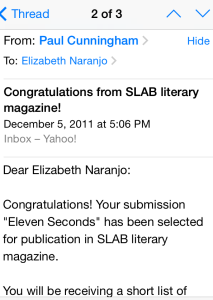Image from Flickr by jepoirrier
Friday was the anniversary of a pretty special occasion for me. On that day, three years ago, I received my first acceptance letter, for a short story called “Eleven Seconds.”
I will never forget the moment I received that email. It was a cold December evening, and we were gathered around the fireplace. I remember when I saw the subject line I cried out, and Abbey, who was nine years old, thought something was wrong. Then I hugged her and I hugged my son and I hugged my husband. I would have hugged you too, had you been there.
I’d been writing stories since grade school, but it wasn’t until my thirties that I began seriously submitting my work. Sometime after my son was born I just decided to go for it. I decided my dream of turning the title “aspiring writer” into “published author” was a good dream, and it deserved to happen, and the only way it would happen was if I stopped hiding behind the idea of it and actually put my work out there.
So I did, and I spent years collecting rejection slips. They didn’t bother me as much as you’d think. Simply corresponding with editors made me feel as if I were moving forward. It put me in a different category of writers. There are those who think about submitting their work, and then there are those who submit their work. Only writers from the second category get their work published, and the rejections they collect along the way become a kind of badge of honor.
I’d heard that once a writer breaks through, the acceptance letters start coming in pretty regularly. And that was true for me–within a month I had another one, and more would soon follow.
But there will always be rejections. Nearly everything I’ve had published was rejected first.
For example, “Eleven Seconds” was rejected three times. The Fourth Wall was rejected twenty-two times. Don’t worry too much about how many times you hear “No,” because it only takes one “Yes.”
Don’t give up.
Here’s the text of my little story that could, which originally appeared in SLAB literary magazine in the spring of 2012. Read it, if you like, and then go submit one of yours.
ELEVEN SECONDS
It started in the kitchen. A clinking of porcelain, a delicate, dreadful trembling, cups and saucers and unused dinner plates jumping in the cupboards like those little beans from Mexico. What were those called?
Thunder ripped the ground and the old man jerked up from his chair, instinctively, but the fear passed through him like a bullet. His heart fluttered once. He sat back down.
From his seat in the living room, the old man watched his kitchen heave forward and burst apart. The world could shatter around you; he knew that. Bending forward, he plucked a fragment of china from the ground, like a flower. His wife, Winnifred, had painted this piece, before the cancer took her last year. He could see her clearly, her pale knotted hand curled around the thin brush, looping and twirling like a dancer. The old man pressed his hands together and folded them over the broken china, like a prayer.
Thanks for reading!
















Connect With Me